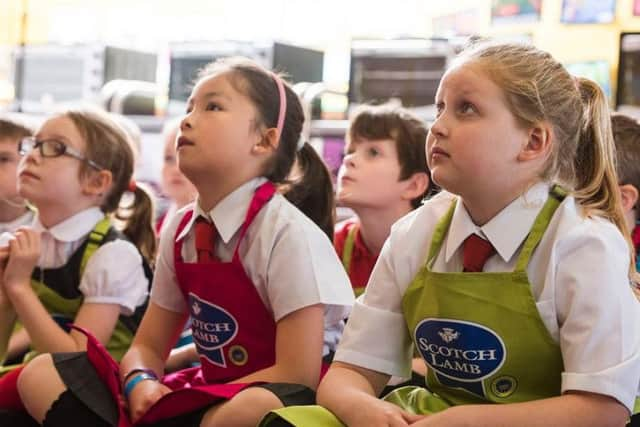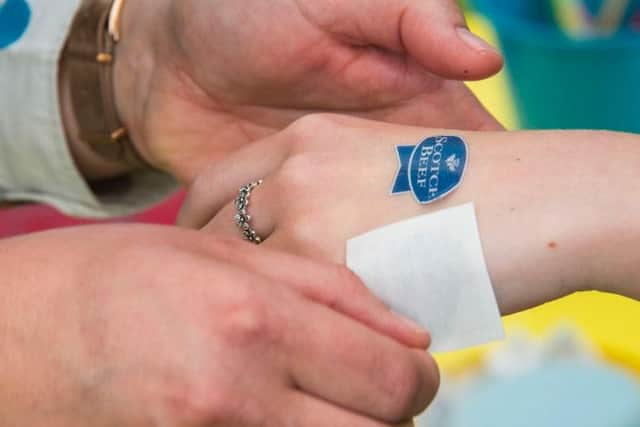Scotch meat still top of the class


After a summer of sport that has enthralled the nation, the goal of a healthy lifestyle has never been more popular. Exercise is one side of the healthy life equation but what we eat is equally important.
The Scottish Government has focused our attention on improving the diet of Scots by promoting healthy eating, and work is going on in support of government targets right across the food and drink sector.
Quality Meat Scotland (QMS) is well-known for promoting world-famous brands Scotch Beef, Scotch Lamb and Specially Selected Pork, but perhaps not so widely appreciated is that it is one of the country’s most energetic standard-bearers for healthy eating.


Behind the scenes, QMS has a busy health and education team, led by dietitian Jennifer Robertson.
The team delivers an impressive range of activities to inspire Scots of all ages to improve their diets and lifestyles, with a particular focus on encouraging families and children to understand more about how to follow a balanced diet.
The team, which includes Mairi Sutherland, who has a sports science background, visits schools throughout Scotland on request to deliver free, interactive educational sessions which usually include a cooking demonstration.
QMS also supports a range of events linked to healthy eating and improving understanding of food and farming around the country, working with a number of partners, including the Royal Highland Education Trust (RHET) and the Love Food Hate Waste campaign run by Zero Waste Scotland (ZWS).


Open Farm Sunday is another initiative that QMS supports, and this June saw a record number of farms open their gates to the public to give them a better understanding of the care that goes into food production.
The Royal Highland Show at Ingliston provides another opportunity to showcase the importance of a healthy diet and the key nutritional role of red meat.
In June, at the show’s Scotch Kitchen Children’s Cookery Theatre, hundreds of children were given an opportunity to cook simple, tasty and healthy dishes with beef, lamb and pork.
Robertson, QMS health and education co-ordinator, says: “We have supported this activity in the Children’s Discovery Centre for several years now and it is a great opportunity to inspire children about good food and cooking and hopefully to encourage their parents to continue this really important life skill education at home.”
At the show, an innovative “Butchery and Beyond” street food competition for schools was won by Our Lady’s Roman Catholic High School in Cumbernauld, Lanarkshire.
The final saw teams from three schools challenged by award-winning butcher S Collins & Son to create a new street food dish.
This initiative, a partnership between QMS, the Food & Drink Federation (FDF) Scotland and Scotch Butcher’s Club member S Collins & Son, introduced pupils to cooking with beef, lamb or pork products.
This month, QMS continues its work with youngsters when it launches its School Meat Voucher Programme for 2018-19.
This scheme, which has gone from strength to strength, offers a free voucher for beef, lamb and pork to every secondary school so that pupils can cook meat dishes.
Robertson says: “We launched this project around a decade ago when we became very aware that tight budgets in the home economics departments of Scottish schools could limit spend on quality protein like Scotch Beef, Scotch Lamb and Specially Selected Pork.
“Many children in schools today will not have been given the opportunity to cook with red meat at home or the chance to taste certain red meats.
“The voucher also offers the opportunity for school staff to connect with their local butchers’ business and to get ideas and inspiration from them.”
The feedback from schools has been extremely positive, says Robertson.
“We regularly get fantastic feedback from schools about the project, including photographs of the dishes pupils are clearly proud to have made. Our hope is that they take their skills and knowledge back home and have the opportunity to continue their education about food and cooking experience with their families.”
QMS has also been undertaking activities as part of the celebration of Scotland’s Year of Young People. This includes supporting the Young Scot Awards this year, with QMS sponsoring the environment award.
Of course, it is not only pupils who benefit from understanding more about where their food has come from or the processes involved in the industry, so QMS has teamed up with a number of food education partners in developing the Good Food Champions teacher training course.
The programme – which takes teachers on a soil-to-plate journey, covering all aspects of food education from planting and harvesting, through manufacturing, to food preparation and eating – is recruiting participants for this year’s courses.
The partners involved are: RHET, FDF Scotland, National Museum for Rural Life, Rowett Institute, ZWS and the Soil Association.
QMS is keen that people understand that red meat production in Scotland is different from that in other parts of the world and has strong sustainability credentials.
About 80 per cent of Scotland’s agricultural area is grass and rough grazing, which is unsuitable for growing fruit, vegetables and cereals but perfect for producing quality beef and lamb.
Leading environmentalists recognise the importance of livestock farming, particularly to Scotland’s hills and uplands.
The industry supports around 50,000 jobs, many of which are in economically fragile areas.
Robertson adds: “During the past year we’ve produced some great short videos highlighting the importance of a healthy diet, and red meat’s role in that, and we’ve recently launched an animated video which very simply communicates the Scottish red meat industry’s positive environmental credentials.”
The short video also highlights the contribution the red meat industry makes to the economy.
Red meat production generates more than £2 billion for Scotland’s economy and the industry benefits from family farms run by farmers who share generations of livestock management skills and also embrace innovation and technology.
Robertson emphasises the importance the industry places on animal welfare, adding: “We work very closely with the Scottish SPCA as part of that. The quality assurance schemes which underpin the Scotch Beef, Scotch Lamb and Specially Selected Pork brands make high animal welfare standards a priority.”
Social media is an important platform for QMS’s education work, with information and inspiration on healthy eating part of the Scotch Kitchen Facebook, Twitter and Instagram feeds.
Ciara Etherson is an executive at Quality Meat Scotland.
Healthy diet
Red meat is naturally nutrient-rich, providing protein, iron, zinc and B vitamins, among others. Beef in particular is a valuable source of easily absorbed iron. Research has shown that women and young girls are most at risk of iron deficiency.
Lean red meat can form part of a healthy balanced diet which contains plenty of fruit, vegetables and starchy foods such as wholemeal bread and brown rice; some protein-rich foods such as meat, fish, eggs and lentils; and some dairy foods.
Marks of quality
Scotch LambTo carry the Scotch Lamb Protected Geographical Indication (PGI) brand, all lamb must have been born, reared and processed in Scotland and spent their entire life on QMS Scotch Assured holdings. Similarly for Scotch Beef.
Specially Selected Pork comes from specific animals that are sourced from selected farms, adopting best practice including animal welfare and natural production methods.
Scotch AssuredThis whole-of-life brand eligibility is delivered by a set of assurance schemes: one livestock – cattle and sheep –and four non-livestock: feeds, haulage, auction market and processor.
Whole-chain assurance underpins the integrity of these premium brands and provides reassurance to consumers of provenance, highest standards of production and animal welfare and wellbeing.
Traceability Traceability of product is key and robust checker systems are in place. Animal welfare and wellbeing are of paramount importance in ensuring the highest product quality.
Animal welfareQMS recognises the Scottish SPCA as its leading partner in matters relating to animal welfare and wellbeing and this collaboration underlines our commitment to transparency and independence.
For more information on Quality Meat Scotland, visit www.qmscotland.co.uk. For more information on Scotch Kitchen, visit www.scotchkitchen.comThis article is taken from The Scotsman's Annual Food & Drink Supplement which can be read in full here.